RISK GOVERNANCE FOR SEAFARERS SAFETY AND HEALTH PROTECTION
DOI:
https://doi.org/10.5821/mt.12872Abstract
The objective of this paper is to assess seafarers’ safety and health management during the COVID-19 pandemic in the context of one Small Island Developing State. This assessment is done using the International Risk Governance Council, Risk Governance Framework as a benchmark for good risk governance. Seafarers are important to the global economy but are often treated unfairly. The recent global pandemic put a spotlight on long-stranding safety and health concerns which were exacerbated during the period leading to what was called the crew change crisis. This paper uses a qualitative approach employing interviews and a focus group with key participants, to explore Jamaica’s response to the crisis, the effectiveness of this response and the lessons to be learnt. The findings showed that Jamaica’s response was reactive and there were tensions between protecting the country’s borders and assisting seafarers. The findings also showed that the effectiveness of Jamaica’s response hinged on protecting the vulnerability of the country’s supply chain rather than seafarers’ safety and health as an end in itself. The paper argues that Jamaica’s response might have been more proactive, providing a win-win outcome, if a systematic approach such as that offered by the Risk Governance Framework was adopted, particularly in the initial stages. The paper is significant as it suggests a policy direction that countries such as Jamaica can take in managing risks of a particular nature in a safety-critical occupation such as seafaring, where it is not normally applied.














